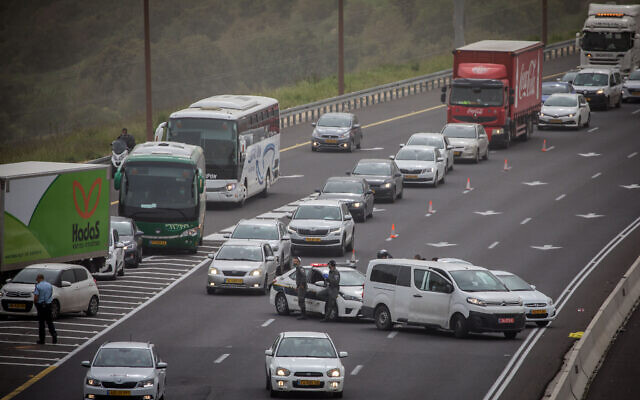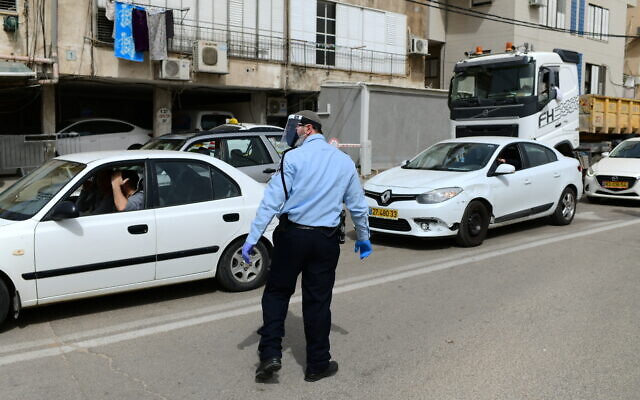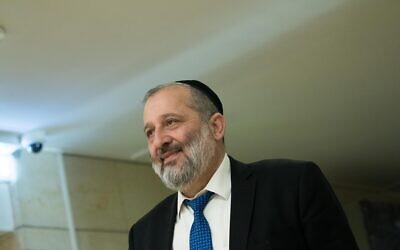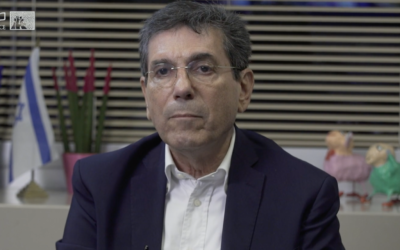Late night meeting also authorizes amendment to Basic Law of State Economy to allow country to tackle financial crisis brought on by virus restrictions

The cabinet early Monday adopted decisions to allow the government to close off several cities and neighborhoods across Israel and the West Bank to combat the spread of the coronavirus and also step up economic assistance to the battered economy.
The cabinet, which met via telephone, authorized a ministerial committee to declare various areas in Israel with high infection rates as “restricted areas,” and gave the same powers to the Israel Defense Force commander in the West Bank.
The cabinet statement, issued after midnight Sunday, did not say who the members of the committee would be.
It was expected to meet Monday afternoon to authorize exactly which areas would be locked down, with reports saying that it would include eight cities and 15 neighborhoods in Jerusalem. However, the restrictions would be less severe than those currently in place in Bnei Brak, with the Ynet news site terming it a “breathing closure.”
The list includes numerous Haredi neighborhoods in Jerusalem, and cities Elad, Migdal Haemek, Beitar Illit, Ashkelon, Tiberias, Or Yehuda and Modiin Illit, according to Channels 12 and 13.

The Jerusalem neighborhoods that were to be sealed were almost exclusively ultra-Orthodox, including Har Nof, Bayit Vegan, Givat Mordechai, Ramat Shlomo, Sanhedria, Shmuel HaNavi, Beit Yisrael, Mea Shearim, Geula, Bucharim, Zichron Moshe, Ramot, Makor Baruch, Givat Shaul, and Kiryat Moshe, according to a draft of the cabinet resolution published by Hebrew media.
The ministers were also expected to approve extending the lockdown of Beni Brak for a further week.
According to Ynet, two cities, Migdal Haemek and Or Yehuda were included on the list to meet the demand of Health Minister Yaacov Litzman and Interior Minister Aryeh Deri, who insisted that not only areas with large ultra-Orthodox populations be put under lockdown.
The cabinet also approved an emergency amendment to Israel’s Basic Law on the State Economy, which will allow for “adapting the budget ceiling and limits on monthly expenditure in order to deal with the coronavirus crisis and financially assist the citizens,” the cabinet said in a statement issued after midnight Sunday.
Hebrew media said this included additional assistance payments to the public through the National Insurance Institute totaling some NIS 16 billion ($4.4 billion) and expanding the framework of the national deficit by NIS 40 billion ($11 billion.)
The decision will be brought before the Knesset for approval later Monday.
The reports said that the IDF would step up its operations in these cities and neighborhoods, many of which are home to sizable ultra-Orthodox communities. Many in the ultra-Orthodox community initially dismissed social distancing regulations, which officials say has led to the high rate of infection.
Defense Minister Naftali Bennett on Sunday night said he had given approval for the deployment of another 700 IDF soldiers to help police enforce emergency restrictions aimed at limiting the spread of the coronavirus. It was unclear when the troops would be deployed and there was no immediate comment from the Israel Defense Forces.

The Beitar Illit Municipality announced Sunday evening that, effective immediately, only residents of the ultra-Orthodox settlement would be allowed into the community.
On Sunday, Deri also said the government is considering imposing a general lockdown over all of Israel ahead of the Passover holiday.
Deri told Channel 12 that the potential nationwide closure was aimed at stopping extended families from gathering Wednesday night for the Passover seder, the first eve of the seven-day festival, which is traditionally celebrated in large groups.
Deri called for Israelis to prepare for the potential closure and said anyone driving that evening could be stopped by police.
He also said that under new restrictions on movement expected to be introduced in a number of areas with high rates of infections, Jerusalem would be divided into eight regions, with residents only allowed to shop for essential supplies within the borders of the regions.
“This is a festive week, especially seder night, and we don’t want families to mobilize,” Deri said. “We want people to only have the seder with the people they live with right now.”

Israelis are already forbidden from venturing more than 100 meters away from their homes except for essential tasks, he noted.
However, Deri added, the government does not want to “paralyze the whole country.” Deri said he had spoken with Prime Minister Benjamin Netanyahu about the matter in principle, and that he did not have more details at that time.
Meanwhile, Prof. Gabi Barbash, the former director general of the Health Ministry, told Channel 12 that the overall situation in Israel’s battle against the coronavirus “is much better” than it was.
The disease has claimed the lives of at least 49 people in Israel as of Sunday evening, with over 8,400 people confirmed to be carriers of the virus.
“We’ve gone down from a doubling of new cases every six days to a doubling every 11 days,” he explained on Channel 12.
That is despite what has been happening in Bnei Brak and other hard-hit areas, he clarified, and was “thanks to the closures.”
“I hope people will maintain” the stay-home discipline, he said, adding that health authorities hope to avoid another spike in cases because of Passover.

If the numbers stay like this, “this gives the authorities a much better starting point” to consider easing some of the restrictions after Passover, Barbash said.
The city of Bnei Brak, with its roughly 200,000 residents, has one of Israel’s largest outbreaks of the coronavirus with 1,214 confirmed cases as of Sunday morning — nearly as many as Jerusalem, which has the largest tally according to Health Ministry data from Sunday. Bnei Brak is one-fifth the size of the capital.
Thousands more people in the city are thought to possibly have the disease but remain untested, either due to medical authorities’ inability to do so or out of individuals’ fears of being quarantined.
Confirmed cases in Bnei Brak have jumped since a week ago, when there were 267. Jerusalem now has 1,302 confirmed cases — up from 352 last week — and Elad surged from 43 to 133.
As reported by The Times of Israel
